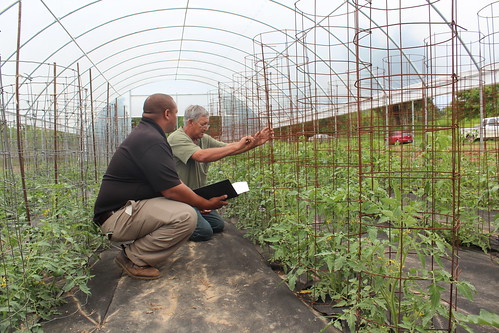
For Danny Daniels, tomatoes take first place. He loves growing them so much, they’re the bulk of the produce raised on his Meridian, Miss. farm.
The retiree–turned–tomato guru started growing the fruit a few years ago. Tomatoes are finicky, and Daniels saw growing them successfully as a challenge.

To improve his operation, Daniels contacted USDA’s Natural Resources Conservation Service (NRCS) about installing a seasonal high tunnel. High tunnels have a metal frame wrapped in plastic and are easy and fairly cheap to build. They are designed to extend the growing season into the cold months, helping to increase productivity, keep plants at a steady temperature and even conserve water and energy.
Daniels enjoys his first high tunnel so much, he plans to apply for a second. He is considering cut flowers for the second high tunnel. While he knows flowers may be a challenge, they sure can’t be harder than tomatoes. There is a growing demand for cut flowers in the Meridian area for banquets, weddings and other events, he says.

In addition to the cut flowers, Daniels plans to expand his repertoire beyond the ‘Early Girl’, ‘Celebrity’ and ‘Bella Rosa’ hybrid variety tomatoes he has mastered. He will also try out other popular Mississippi produce, such as squash, zucchini and peppers in the garden near his inaugural high tunnel.
NRCS funds high tunnels, like the one on Daniels’ farm, as part of USDA’s Know Your Farmer, Know Your Food initiative, launched in 2009 to help local food systems thrive. You can search the Know Your Farmer, Know Your Food Compass for high tunnel projects near you.
Daniels definitely makes an impact on the Meridian-area food system, as he sells his produce at a local farmer’s market and from a vegetable stand in front of his farm.
He plans to put more emphasis on his vegetable stand this year, which is located in the outskirts of Meridian, in reach of town dwellers in search of local produce. Buying local is not only good for the local economy, but is also better for the consumer, he says.

Learn more about Know Your Farmer, Know Your Food.
Follow NRCS on Twitter.
Check out other conservation-related stories on the USDA blog.
